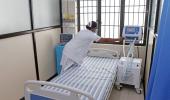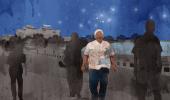Dear patients and caregivers, be forewarned.
The disease is deadly in the truest sense. Only the mildest forms seem to be curable, and those too, if detected earlier, observes Shreekant Sambrani.

October is observed as cancer awareness month. The third Indian Cancer Congress (November 2 to 5) has just concluded in Mumbai.
It is, therefore, an appropriate time for me to continue with my mission of sharing what knowledge I have gained of this scourge in the hope that the onerous life of at least a few cancer patients and their immediate caregivers is eased to whatever extent possible.
My cousin Ramesh, a rising star of the Supreme Court Bar, was diagnosed with an advanced case of lung cancer 30 years ago.
He came to the Tata Memorial Cancer Centre in Mumbai for treatment with his wife Kiran, a brilliant historian at Delhi University.
His older brothers, a retired high court judge and a very senior civil servant, did not tell him or Kiran of the dire prognosis of the Centre. That task fell to me as Kiran rightly insisted on being fully informed.
Ramesh passed away six weeks later. Kiran, who had cared for her sister dying from cancer a couple of years earlier, said she thought she had paid her dues.
I, too thought that I had had my share of cancer caring, but that was not to be the case.
In 2006-2007, I attended closely to my dear family friend and mentor, the noted economist Manu Shroff in his doomed struggle against lung cancer.
In 2009, My mother-in-law succumbed to gioblastoma, a very aggressive cancer of the brain (Then United States senator Edward Kennedy was diagnosed with the same disease at around the same time. He survived four more years under a very harsh and expensive treatment regimen which severely impaired the quality of his life).
My wife's older sister fell victim to non-Hodgkinson's lymphoma in 2014. And finally, my wife waged a stoic but losing battle against ovarian cancer between 2019 and 2021.
My every waking moment then was devoted to her care.
In these three decades, I have read incessantly about the disease -- on the Net, in journals, some of which I could barely understand and in books, most notably Siddhartha Mukherjee's tour de force, The Emperor of All Maladies.
Most doctors, including my wife's oncologist, advised me against this, but I have persisted. I believe I have now reached a stage of knowing the limits of my vast ignorance.
I have also come to believe that our doctors, especially oncologists, do not tell us all that we need to know, possibly because of the mistaken belief that the less we know, the less distressed we would be, but equally possibly because they themselves do not know all that they should.
I have tried here to cover a few basic points that cancer patients and their immediate caregivers should understand so that their heroic struggle is better directed and ultimately a little less heart-breaking, if such a thing is at all possible.
The first thing to stress is that cancer is not one disease, but a whole class of disorders which have one common element: An uncontrolled growth of cancer cells, which defying their life cycle, refuse to die.
They can be from any part of the body, organs, glands or bodily fluids. This is well-understood, but not necessarily its most important consequence: Oncology is not a single specialisation, unlike, say, cardiology.
Since cancers are of all different kinds affecting various parts of our anatomy, doctors treating them would need to know in depth the structure and functioning of the affected organ or gland.
Therefore, it would be virtually impossible for any but the most gifted and accomplished clinical or research specialist to know the vast spectrum of behaviour of cancers.
And by the same token, it might well be impossible for a cancer patient or a caregiver to find the right kind of subspecialist competence to treat the disease at hand.
For example, a gynaecological oncologist might perforce be called upon to treat neurological cancers such as glioblastomas, with likely less than satisfactory outcome for the patient and the doctor.
And if the doctor pleads inability to offer treatment, it could well be misunderstood as callousness. That is a measure of the devastating nature of this disease.
Second, barring a few specific disorders such as lung or cervical cancer which may be caused by external agents (cigarette smoke and viruses, respectively), most cancers are endogenous -- caused by factors internal to the body.
Cellular biology research shows that most cells have in them potential oncogenes (those leading to their uncontrolled growth) and their potential suppressors.
When the oncogenes start growing or repressors stop preventing them, cancer occurs and spreads.
Dr Mukherjee uses an evocative simile of a vehicle with a jammed accelerator or failed brakes careening across pathways within the body causing havoc in its wake.
In other words, anyone can get cancer and that is a random process. To paraphrase Albert Einstein, nature does indeed play dice with our bodies.
The second consequence is that eradicating (as against controlling or treating) cancer is as impossible as eradicating life or death itself.
Third, most standard cancer treatments aim to annihilate cells through surgery, or by treating them with deadly toxic chemicals or by bombarding them with radiation. This has a possibility of working reasonably when the cancer cells are concentrated in one location.
Even so, this line of treatment requires that all malignant cells must be removed; otherwise, the remaining cells will cause a recurrence of the disease.
Unforrtunately, for such treatments to truly succeed, the surgery most likely would have to be radical which would have myriad other negative consequences, such as impairing other functions of the body; the dose of chemicals or radiation so high as to cause possibly irreversible damage to surrounding healthy cells.
And the ideal combination or dosage still remains very much a matter of trial and error.
All of this is beside the point if the cancer is metastasised, i e travelled to locations other than where the disease first occurred.
Most lines of treatment are likely to be of little effectiveness in case of a metastatic cancer.
Fourth, specialists are now discovering that targeted cellular treatment can also be subject to random mutations.
Cancer cells can change their structure and become immune to the treatment they had earlier responded to. And the variations here are practically endless, as a cell could have upward of 20,000 genes.
Genome mapping of all known cancers presently underway is expected to be orders-of-magnitude larger and more complex than human genome mapping which took over a decade and many billions to complete.
All this makes treatment of most cancers extremely costly regardless of the region where treatment is being conducted.
Most insurance plans cover only a small part of the treatment and none at all if the patient is undergoing therapy. Add to this the likely long duration of the treatment.
Thus cancer affects not just the physical well-being of cancer sufferers but equally, the economic welfare of their families as well and possibly for a long period
Finally, a prognostication of survival is like the mileage claims in an automobile advertisement -- under ideal conditions and barring no other complications.
Remember, too, that the remaining years is an outer limit, and not all of those will be disease-free.
The point of all this, dear patients and caregivers, is to be forewarned. The disease is deadly in the truest sense. Only the mildest forms seem to be curable, and those too, if detected earlier.
So what are we to do, when faced with such a calamity among our midst?
First, find out as much as possible even if one has to make a nuisance of oneself.
Second, accept the most extreme treatments offered only after a careful analysis of the consequences. Understand that new drugs are not miracles and doctors and surgeons are not gods.
The greatest priority at all times must be to provide the patient as comfortable and pain-free an existence as possible under the circumstances.
It is the quality of life and not its mere length that ought to matter.
And, unfortunately for all of us, the Emperor wins almost always. But that must not break our spirit.
Feature Presentation: Ashish Narsale/Rediff.com











